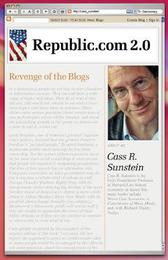
|
Republic.com 2.0
Paperback / softback
Main Details
| Title |
Republic.com 2.0
|
| Authors and Contributors |
By (author) Cass R. Sunstein
|
| Physical Properties |
| Format:Paperback / softback | | Pages:272 | | Dimensions(mm): Height 216,Width 140 |
|
| Category/Genre | Ethical and social aspects of computing |
|---|
| ISBN/Barcode |
9780691143286
|
| Classifications | Dewey:303.4833 |
|---|
| Audience | | General | | Tertiary Education (US: College) | | Professional & Vocational | |
|---|
| Illustrations |
2 tables.
|
|
Publishing Details |
| Publisher |
Princeton University Press
|
| Imprint |
Princeton University Press
|
| Publication Date |
6 September 2009 |
| Publication Country |
United States
|
Description
What happens to democracy and free speech if people use the Internet to listen and speak only to the like-minded? What is the benefit of the Internet's unlimited choices if citizens narrowly filter the information they receive? Cass Sunstein first asked these questions in 2001's Republic.com. Now, in Republic.com 2.0, Sunstein thoroughly rethinks the critical relationship between democracy and the Internet in a world where partisan Weblogs have emerged as a significant political force. Republic.com 2.0 highlights new research on how people are using the Internet, especially the blogosphere. Sunstein warns against "information cocoons" and "echo chambers," wherein people avoid the news and opinions that they don't want to hear. He also demonstrates the need to regulate the innumerable choices made possible by technology. His proposed remedies and reforms emphasize what consumers and producers can do to help avoid the perils, and realize the promise, of the Internet.
Author Biography
Cass R. Sunstein is the Felix Frankfurter Professor at Harvard Law School. His many books include "Worst-Case Scenarios", "A Constitution of Many Minds", and, with Richard Thaler, "Nudge".
ReviewsPraise for Republic.com: "Republic.com raises important and troubling questions about the effects of the Internet on a democratic society."--Stephen Labaton, New York Times Book Review "In this follow up to Republic.com, his first appraisal of technology's effect on public discourse, University of Chicago Law School professor Sunstein waxes pessimistic about today's 'nightmare' of limitless news and information options--and, more significantly, the limitless options for avoiding it...This perceptive volume effectively illuminates the contradictory impulses at the heart of the citizen-consumer."--Publishers Weekly "Republic.com 2.0 is a refreshing counter to overly optimistic perspectives on the internet and democracy, and Sunstein turns Utopian visions of the internet enabling individuals to gain access to exactly what they are interested in--'The Daily Me'--into a critical assessment of its potential for undermining democratic discourse."--William Dutton, Times Higher Education "[Sunstein] argues persuasively that the fragmented market for communications, which may cater to the desires of consumers, is harmful to the development of informed and moderate citizens because it limits or even makes impossible exposure to unsolicited, diverse, and occasionally unwelcome views, all of which are necessary in democracies...This book is a splendid antidote to the views of the utopian populists who equate democracy with information choice provided over the internet."--B. Cooper, Choice Praise for Republic.com: "Cass Sunstein sounds a timely warning in this concise, sophisticated account of the rise of the internet culture. He argues that it is our very ability to wrap ourselves in our own tastes, views, and prejudices with the aid of technology that constitutes a real threat to the traditional democratic values."--Peter Aspden, Financial Times "By its nature, Sunstein argues, the Web fragments us into ever-smaller niches. In this way, for all of its incredible, information-sharing connectivity, the Web can be isolating, especially when groups begin to 'echo chamber' and talk only to themselves...To my mind, Sunstein has always been lucid and valuable on this topic. But despite the Web's culture-changing successes--wiring up the economy, influencing presidential campaigns--many Web advocates and bloggers still act as though they're threatened. When they're not acting triumphalist, that is. Even the lightest guidelines, in short, will be resented, particularly when our confusion of free markets with free speech has proved so profitable."--Jerome Weeks, San Francisco Chronicle "This book, now in a substantially revised edition, remains the most effective public work depicting this debate and urging on us this proper vision of a reasonable freedom."--Charles Mathewes, Virginia Quarterly Review "Lucid and thought-provoking, Republic.com 2.0 raises important concerns... Carefully argued, well balanced, and accessible to a general audience."--Elisabeth Herschbach, Metapsychology Online Reviews
|